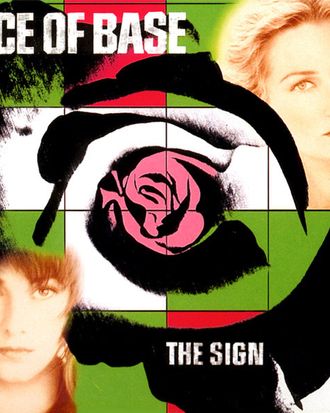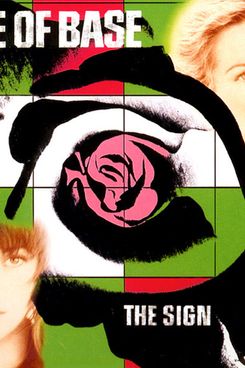

The Nostalgia Fact-Check is a recurring Vulture feature in which we revisit a seminal movie, TV show, or album that reflexively evinces an “Oh my God, that was the best ever!” response by a certain demo, owing to it having been imprinted on them early. Now, years later, we will take a look at these classics in a more objective, unforgiving adult light: Are they really the best ever? How do they hold up now? Having already considered Heathers and Ally McBeal, we turn our attention to Ace of Base’s The Sign.
Background: Ace of Base, a four-piece pop group from Gothenburg, Sweden, released their debut album, Happy Nation — renamed The Sign for its U.S. release — in 1993. On the strength of three monster singles, “The Sign,” “All That She Wants,” and “Don’t Turn Around,” the album would sell over 9 million copies. While the band has, amazingly, remained active in some form or another up until the present day, if you have any feelings of nostalgia toward them, they are almost definitely derived from The Sign.
Nostalgia Demo: Roughly, anyone interested in mainstream pop music in 1993, with a caveat: Those between the ages of 8 and 16 loved it uncomplicatedly, while those older than 16 may have acted in public as if they were too cool for The Sign while secretly bumping it behind closed doors. Years later, they may have forgotten all about said public shame and retroactively accepted Ace of Base as a proud mainstay of their less-discerning past.
Nostalgia Fact-Check: Before writing this piece, the information I could have shared about Ace of Base, with a gun to my head, is as follows: There are two girls and two dudes in the band. The girls sing, but it’s not clear what the dudes do. The two-girls/two-dudes format of Ace of Base is the same as that of iconic Swedish pop act ABBA; presumably, this was a conscious mimicry. Also, one of the members of Ace of Base was at one point associated with neo-Nazism in some form. I recall this last fact because my friend once told me a story about angrily shouting down her own bat mitzvah D.J. after he put on Ace of Base at the bat mitzvah party. Oh, and I enjoyed their songs very much when I was a kid.
The amount of that confirmed by the Internet: Ace of Base does indeed have two female members and two male members, but it’s not clear this is because of ABBA. It turns out that three of the members — vocalists Jenny Berggren and Linn Berggren, and keyboardist Jonas “Joker” Berggren — are siblings. The fourth, Ulf “Buddha” Ekberg, was Jonas’s buddy, and he’s the alleged neo-Nazi. The Internet isn’t as comprehensive as one would like about Buddha’s past, but here’s a snippet from a 1995 Toronto Sun piece: “The band also successfully weathered a media storm about Buddha’s past as a drug and alcohol-abusing teenager, when he was a member of a neo-Nazi skinhead gang. ‘We have this Christian way of living to understand people and say ‘Okay, you’ve got a problem here, let’s take care of it.’ Instead of turning your back on somebody,’ says Linn.” (And, according to YouTube, this is “a nazi song performed by Ulf Ekberg in Ace of Base in his youth.”) Also, the male members wrote the songs and played instruments live.
And then there’s the more important piece of information: “The Sign” is still a very good pop song. This probably isn’t surprising to you. There’s a good chance you’ve heard it at least once or twice during the last six months. Some of you may even have performed it at karaoke. (If not, you should consider it for next time. You friends will likely commend you for your sharp decision making.) This is the kind of uncomplicated relationship most of us can have with “The Sign.” Once we rocked out to it, in various living rooms and bedrooms and, yep, religiously affiliated coming-of-age ceremonies. And then, quickly, we developed pop-music consciousness, and felt shame. Years later, we got over our hang-ups, and started taking pop music seriously. And now we can all look back and realize, with a deep sigh of relief, that we appreciate “The Sign,” and are nostalgic for it, unironically.
In 1993, this was an effective pop song: that loose drum-machine beat, the reggae-lite guitar riff, that big buoyant chorus expressing basic universal sentiments we can all feel something about (real talk, where do you belong?). Now the basics of the song are dated: Production techniques have gotten much more sophisticated, and, like much of this album, “The Sign” sounds overwhelmingly analog (like, you can more or less pick out what instrument is making what sound, and that feels kind of bizarre). And while Europop has definitely seeped onto the American charts, present in various degrees via Pitbull and Lady Gaga and the Black Eyed Peas, it has also gotten a lot faster and a lot harder since Ace of Base. There are certain moments on The Sign where the pace is reminiscent of techno. For the most part, though, it’s quieter, quainter.
So, yes, it’s dated. Nonetheless, in 2011, “The Sign” is still very much an effective pop song. Here’s a helpfully explicative Katy Perry quote that dates from the recording process of Teenage Dream: “I’m kind of thinking I want to do my record like a mesh between ‘Lovefool’ by the Cardigans and [’The Sign’] by Ace of Base … I want to make songs that people want to hold hands and roller-skate to.”
How about the other singles? “All That She Wants” has that cool skittery flute sound that weaves in and out, but its other elements — that weird robo-sax riff, the rudimentary synth burbles — are anachronistic in a more jarring way than those on “The Sign.” This might be an incident where my personal history is coloring my interpretation, though: I distinctly recall thinking this song was about a woman who wanted “another baby,” as in a human baby, and was planning on stealing it from the narrator. It’s been at least a few years since I realized this is actually about a woman looking for a “baby,” as in a romantic partner, but that ominous original interpretation hangs heavily.
“Don’t Turn Around” has actually aged better. It’s got that same upstroke reggae thing that is apparently on every Ace of Base song, but the whole package is tighter, the structure not so clearly bare. The verses are in particular a treat, with Jenny (or Linn?) endearingly and unconvincingly telling off an ex-boyfriend: “I’m gonna be strong / I’m gonna be fine / don’t worry about this heart of miiiiiine.” There’s also a three-bar spoken-word rap thing (“as he walks away / he feels the pain getting strong … “) that probably made the dudes in Lonely Island laugh a lot when they were little. And, fun fact: “Don’t Turn Around” was co-written by Albert Hammond, who would later father the Strokes guitarist who isn’t Nick Valensi.
As for the album as a whole with fresh ears, there’s just no getting around one basic fact: Holy shit, these lyrics are insane. Seriously, close your eyes and pick at random, and you’ll uncork a winner. Like, “Dancer in a Daydream”: “Come and be a dancer, dance into my daydream / join me in the jungle/wet and wild / to help another person / will make you feel important / you got my invitation / but you’re so shy.” Or “Wheel of Fortune”: “What you gonna tell your dad / it’s like a wheel of fortune / and what you gonna tell your dad / if this wheel lets you down.” And, my new favorite, “Waiting for Magic”: “Kiss me baby I’m attractive / Baby get to know me / Show me who you are / Give me that magic / Baby I’m eternal / Lying in a coffin / Waiting for you.” Pop lyrics can obviously be dumb nowadays, too, but the English-as-second-language nature of them has certainly been toned down.
In general, once you get outside of the singles, this thing really does start to fall apart. The same tinny sounds — basic keyboard synths, basic drum programming — are brought back again and again, rearranged slightly or sped up, but always bluntly obvious. (Buddha and Joker’s pop acumen is undeniable, and their songwriting track record speaks for itself. But, at least on The Sign, they weren’t so into variety.) The adjective that feels most accurate, you will be totally not surprised to learn, is cheesy. There’s a moment in “My Mind (Mindless Mix),” after the beat has been playing wordlessly for about 40 seconds, where a modulated male voice busts in to say one word: “dance.” And that just about sums things up nicely for the vibe of the album as a whole.
But I’m already far too deep into the rabbit hole to be put off by a little cheesiness. Listening to this album again has made me care about the original band dynamics of Ace of Base. Did you know they released an album last year, only with new female vocalists replacing the Berggren sisters? So were the sisters pushed out, or did they leave? Did Buddha ever date one of the Berggrens, and was Joker cool with it? Please, someone, write an in-depth magazine profile of Ace of Base and get all those future children of Swedish electronic music — from Teddybears to Robyn to Max Martin — to weigh in on their legacy. Here’s a good jumping-off point: In that same 1995 Toronto Sun article, Linn was identified as “a big fan of punk, particularly The Clash, and classical music, and hopes Ace Of Base’s next album will have a rougher, messier sound. ‘I’d like to be much more instrumental the next time. If I get another chance to make my own music again, I would do it in a much more experimental way.’” Why didn’t Linn ever get that chance?




